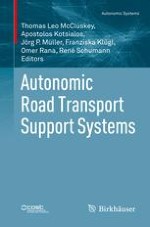2016 | OriginalPaper | Buchkapitel
A Game Theory Model for Self-adapting Traffic Flows with Autonomous Navigation
verfasst von : László Z. Varga
Erschienen in: Autonomic Road Transport Support Systems
Aktivieren Sie unsere intelligente Suche, um passende Fachinhalte oder Patente zu finden.
Wählen Sie Textabschnitte aus um mit Künstlicher Intelligenz passenden Patente zu finden. powered by
Markieren Sie Textabschnitte, um KI-gestützt weitere passende Inhalte zu finden. powered by
